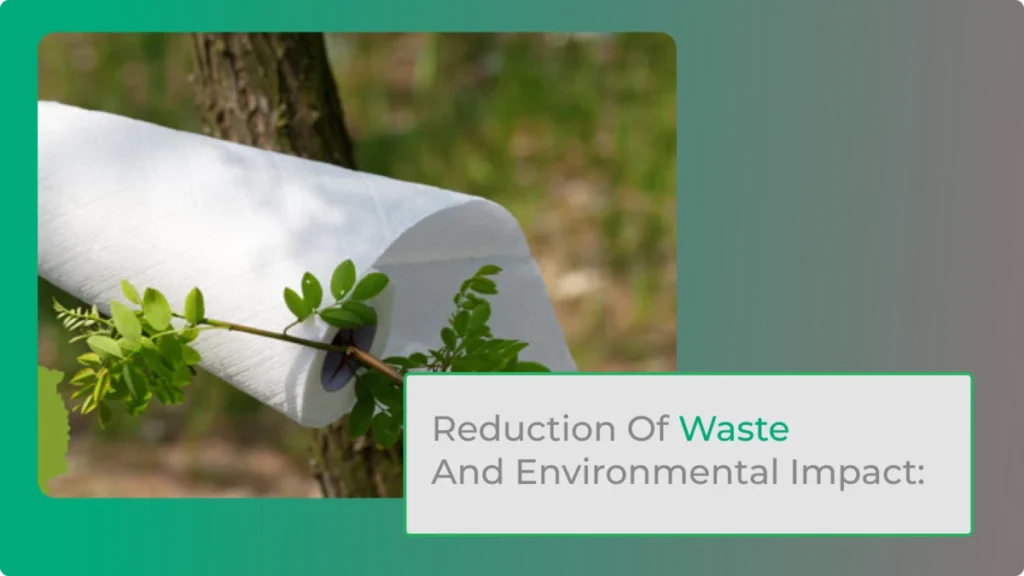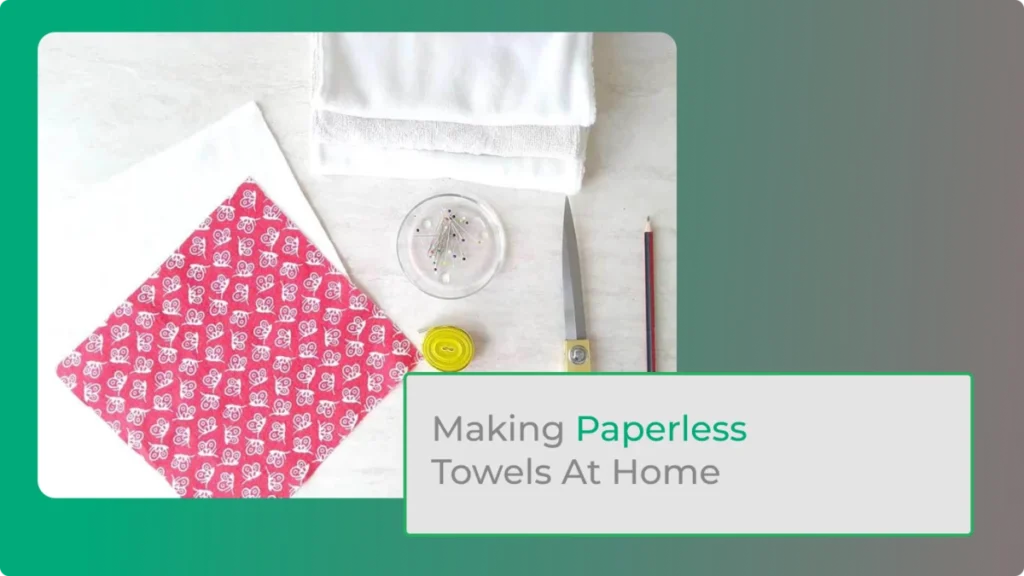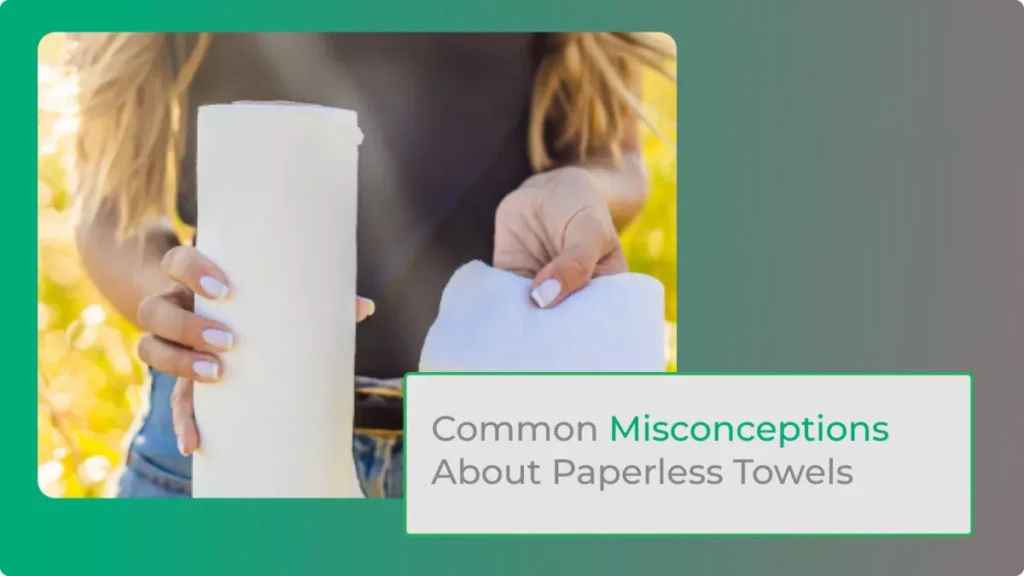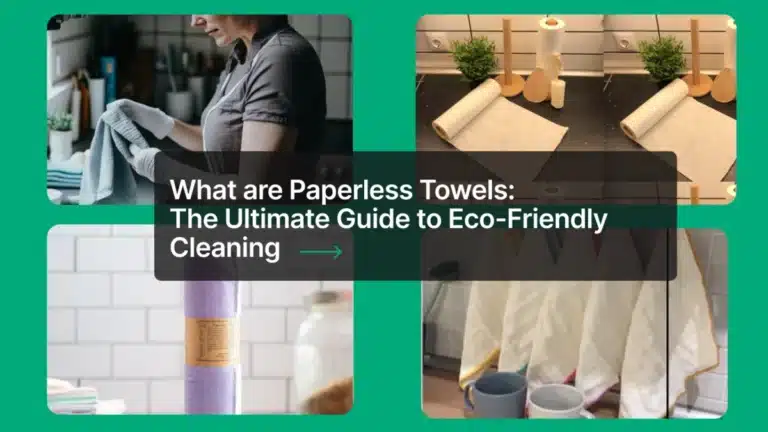Paperless towels are reusable fabric alternatives to traditional paper towels used for cleaning and wiping. These eco-friendly towels reduce waste and are made from absorbent materials that can be easily washed and reused, making them a sustainable option for households and businesses aiming to reduce their environmental impact.
With their durable construction and ability to absorb spills and messes, paperless towels offer an effective and more sustainable alternative to disposable paper towels, allowing users to save money and contribute to a greener future. Start incorporating paperless towels into your cleaning routine to make a positive impact on the planet while still maintaining a clean and tidy home or workspace.
- 1 The Rise Of Eco-Friendly Cleaning Practices
- 2 Characteristics Of Paperless Towels
- 3 Benefits Of Using Paperless Towels
- 4 How To Use Paperless Towels
- 5 Popular Types Of Paperless Towels
- 6 Making Paperless Towels At Home
- 7 Tips For Choosing The Best Paperless Towels
- 8 Common Misconceptions About Paperless Towels
- 9 Future Trends In Eco-Friendly Cleaning Practices
- 10 Frequently Asked Questions For What Are Paperless Towels
- 11 To summarize, Paperless towels
The Rise Of Eco-Friendly Cleaning Practices
Paperless towels are an innovative and eco-friendly cleaning solution that eliminates the need for disposable paper towels. With their reusable and washable design, paperless towels help reduce waste and promote sustainability in cleaning practices. Switching to paperless towels is a simple yet impactful way to embrace eco-conscious habits in our daily routines.
As awareness about environmental conservation grows, more and more people are seeking sustainable alternatives for their everyday cleaning needs. One such alternative rapidly gaining popularity is paperless towels. These eco-friendly options provide a practical solution to reducing waste and minimizing the environmental impact caused by traditional paper towels.
In this section, we will explore the history of paper towels and their environmental impact, as well as the growing interest in sustainable cleaning practices that have led to the introduction of paperless towels.
History Of Paper Towels And Their Environmental Impact:
- Paper towels have been a staple in households and commercial settings for decades due to their convenience and absorbency.
- However, the production and disposal of paper towels have significant environmental consequences:
- Deforestation: The manufacturing process requires vast amounts of trees, leading to deforestation and a loss of wildlife habitat.
- Water consumption: Paper towel production consumes a substantial amount of water, contributing to water scarcity in some regions.
- Energy usage: The manufacturing process involves energy-intensive procedures, adding to carbon emissions and climate change.
Growing Interest In Sustainable Alternatives For Everyday Cleaning:
- As individuals become more conscious of their environmental footprint, there is a rising demand for eco-friendly cleaning options:
- Environmentally conscious consumers increasingly prioritize products that align with their values, seeking alternatives that minimize waste and reduce carbon emissions.
- The desire to adopt sustainable practices extends to daily routines, including cleaning activities, prompting people to explore greener alternatives to traditional paper towels.
- The availability of information about the environmental impact of consumer products has further driven interest in sustainable alternatives for everyday cleaning.
Introduction Of Paperless Towels As An Eco-Friendly Option:
- Paperless towels offer an appealing alternative to traditional paper towels, addressing many of the environmental concerns associated with their use:
- Reusable and durable: Paperless towels, often made from materials like bamboo or organic cotton, can be washed and reused multiple times, reducing waste and the need for continuous repurchase.
- Reduced carbon footprint: By eliminating the need for frequent production and disposal, paperless towels help reduce carbon emissions associated with the manufacturing and transportation of single-use paper towels.
- Versatile and effective: Despite being reusable, paperless towels maintain their absorbency and effectiveness, making them a sustainable and practical choice for a wide range of cleaning tasks.
With the rise of eco-friendly cleaning practices, paperless towels have emerged as a viable and sustainable alternative to traditional paper towels. Their eco-friendly nature, combined with their durability and versatility, makes them an attractive choice for individuals committed to reducing their environmental impact.
By adopting paperless towels, we can contribute to a cleaner and greener future, one cleaning task at a time.
Characteristics Of Paperless Towels
Paperless towels are reusable alternatives to traditional paper towels. They are made from absorbent materials such as bamboo or cotton, offering a sustainable and eco-friendly option for cleaning up spills and messes. With their durability and eco-conscious characteristics, paperless towels are gaining popularity among those looking to reduce waste and live more sustainably.
Paperless towels are an innovative and eco-friendly alternative to traditional paper towels. They offer several characteristics that make them a popular choice for those seeking sustainable and cost-effective options. Let’s explore the key characteristics of paperless towels:
Materials Used In Paperless Towel Production:
- Organic Cotton: Paperless towels are often made from organic cotton, a natural and biodegradable material that is grown without the use of harmful chemicals or pesticides. This makes them an environmentally friendly choice.
- Bamboo Fiber: Another common material used in the production of paperless towels is bamboo fiber. Bamboo is a highly sustainable resource that grows rapidly and requires minimal water and pesticides. The use of bamboo fiber in paperless towels adds to their eco-friendly nature.
Reusability And Durability Of Paperless Towels:
- Long-lasting: One of the standout features of paperless towels is their durability. Unlike their disposable counterparts, paperless towels are designed to be reused multiple times. They are made to withstand frequent use, making them a cost-effective option in the long run.
- Easy to Clean: Paperless towels are also easy to clean, which further adds to their reusability. They can be washed by hand or machine-washed, depending on the manufacturer’s instructions. By simply washing and drying them, they can be ready to use again and again.
Absorbency And Effectiveness Compared To Traditional Paper Towels:
- High Absorbency: Paperless towels are known for their excellent absorbency. Whether you’re cleaning up spills, wiping surfaces, or drying dishes, paperless towels are designed to efficiently absorb liquids and provide effective cleaning.
- Versatility: These towels are not only absorbent but also versatile in their uses. They can be used for various household tasks, such as dusting, cleaning windows, or even as napkins during meals. Their versatility makes them a practical choice for everyday cleaning needs.
- Environmentally friendly: By opting for paperless towels, you are actively reducing paper waste. This not only has a positive impact on the environment but also helps in conserving natural resources and reducing carbon emissions associated with the production of traditional paper towels.
Paperless towels are a sustainable, durable, and effective alternative to traditional paper towels. With their use of eco-friendly materials, reusability, and high absorbency, they provide a practical solution for those seeking to reduce their environmental footprint without compromising on effectiveness.
Benefits Of Using Paperless Towels
Paperless towels offer a sustainable and convenient alternative to traditional paper towels. Made from absorbent and reusable materials, they not only reduce waste but also save money in the long run. Their eco-friendly nature makes them an excellent choice for those looking to reduce their carbon footprint.
Paperless towels provide numerous benefits compared to traditional paper towels. By incorporating these environmentally friendly alternatives into your daily routine, you can contribute to a greener future while enjoying a range of advantages. Let’s explore some of the key benefits:
Reduction Of Waste And Environmental Impact

- Sustainable choice: Paperless towels are reusable and can be washed and reused multiple times, significantly reducing waste. This reduces your carbon footprint and helps conserve natural resources.
- Less landfill waste: Traditional paper towels contribute to the 254 million tons of waste that end up in landfills each year. By using paperless towels, you can play a part in reducing this environmental impact.
- Preservation of trees: Paper towels are derived from trees, and their production requires cutting down large quantities of these vital resources. Opting for paperless towels helps preserve forests and protects biodiversity.
Cost-Effectiveness And Long-Term Savings:
- Economical alternative: While paperless towels may have a higher upfront cost compared to disposable paper towels, they prove to be cost-effective in the long run. By eliminating the need for continuous purchases, you can save money over time.
- Durability: Paperless towels are made from high-quality materials and designed to withstand repeated use. Their resilience ensures they last longer than traditional paper towels, leading to greater savings.
- Versatility: Paperless towels can be utilized for various cleaning tasks, making them a versatile option. From spills and stains to household chores, they offer a multi-purpose solution, eliminating the need for different types of disposable towels.
Health Benefits And Reduced Exposure To Chemicals:
- Chemical-free option: Traditional paper towels often contain bleaches, dyes, and other chemicals that may be harmful to your health. By switching to paperless towels, you can reduce your exposure to these potentially hazardous substances.
- Hypoallergenic properties: Many paperless towels are made from natural fibers, such as bamboo or organic cotton. These materials are hypoallergenic, making them gentle on the skin and suitable for those with sensitivities or allergies.
- Enhanced cleanliness: Paperless towels can be easily sanitized and thoroughly cleaned, minimizing the risk of bacterial growth. This promotes a healthier living environment for you and your family.
As you can see, using paperless towels presents a wide range of benefits. From reducing waste and environmental impact to cost-effectiveness and improved health, this eco-friendly alternative is a practical and sustainable choice for everyday use. Embracing paperless towels not only benefits you personally but also contributes to a greener and cleaner planet.
How To Use Paperless Towels
Paperless towels are an eco-friendly alternative to traditional paper towels. Made from reusable materials like fabric or bamboo, they help reduce waste and are easy to use and clean. Simply grab a paperless towel whenever you need to wipe up a spill or clean a surface, and then toss it in the wash for reuse.
What Are Paperless Towels
Paperless towels, also known as reusable or washable towels, are an eco-friendly alternative to traditional paper towels. Made from materials such as bamboo, cotton, or microfiber, these towels are designed to be used multiple times, reducing waste and saving money in the long run.
They are highly absorbent and durable, making them suitable for a variety of cleaning tasks around the house. In this blog post, we will explore how to use paperless towels effectively, including versatile applications, proper care, and transitioning from traditional paper towels.
Using paperless towels is easy and can help you become more environmentally conscious. Whether you want to wipe spills, clean surfaces, or tackle tough messes, paperless towels are a versatile option for various cleaning tasks. Here are some tips on how to use them effectively:
- Versatile applications for different cleaning tasks:
- Kitchen cleaning: Paperless towels can be used for wiping countertops, cleaning appliances, and drying dishes.
- Bathroom cleaning: Use them for wiping sinks, mirrors, shower stalls, and toilet seats.
- Dusting: Paperless towels are great for dusting furniture, electronics, and other surfaces.
- Mopping spills: Absorbent paperless towels can quickly mop up spills on floors or carpets.
- Proper care and maintenance of paperless towels:
- Washing: After each use, rinse the paperless towels with water and wring them out. Machine wash them in cold water with a mild detergent, avoiding fabric softeners.
- Drying: You can air dry paperless towels or put them in the dryer on a low heat setting. Avoid using dryer sheets as they may reduce the towels’ absorbency.
- Storage: Keep the clean paperless towels in a designated area, such as a drawer or basket, so they are readily available when needed.
- Transitioning from traditional paper towels to paperless towels:
- Start small: Begin by replacing a few rolls of paper towels with a set of paperless towels. Gradually increase the number of paperless towels as you become more comfortable using them.
- Educate the household: Share the benefits of paperless towels with your family or housemates. Show them how to use and care for the towels to encourage their participation.
- Be prepared: Keep a designated container or basket for used paperless towels until laundry day. Place a small bin nearby for compostable or biodegradable disposable wipes for messier tasks.
By incorporating paperless towels into your cleaning routine, you can reduce waste, save money, and contribute to a more sustainable lifestyle. Make the switch today and enjoy the benefits of these eco-friendly alternatives to traditional paper towels.
Popular Types Of Paperless Towels
Discover the most popular types of paperless towels that are eco-friendly alternatives to traditional paper towels. These reusable towels are designed to be long-lasting, absorbent, and easy to clean, making them a sustainable choice for reducing waste in your home.
When it comes to paperless towels, there are several popular types that offer sustainable alternatives to traditional disposable paper towels. Made from environmentally friendly materials, these towels are not only gentle on the planet but also effective for various household tasks.
Let’s explore the most sought-after options available:
Organic Cotton Towels:
- Grown without the use of synthetic pesticides or fertilizers, organic cotton towels are a fantastic choice for those looking to minimize their ecological footprint.
- Soft and absorbent, these towels are highly durable and can be used repeatedly, making them an excellent investment in the long run.
- Organic cotton towels are perfect for cleaning kitchen spills, wiping surfaces, or even drying produce.
Bamboo Towels:
- Renowned for its sustainability and fast-growing properties, bamboo is a popular material for paperless towels.
- These towels are exceptionally soft, making them ideal for sensitive skin and delicate surfaces.
- Bamboo towels are highly absorbent and can easily replace traditional paper towels for household cleaning tasks.
- By choosing bamboo towels, you contribute to reducing deforestation and promoting a greener lifestyle.
Microfiber Towels:
- Constructed from ultra-fine synthetic fibers, microfiber towels are highly efficient at trapping and absorbing liquids and dirt.
- These towels are exceptionally durable and can withstand frequent use and washing without losing their quality.
- Microfiber towels are versatile and can be used for a range of purposes, such as dusting, drying dishes, or cleaning windows and mirrors.
Hemp Towels:
- Hemp towels offer impressive durability and strength, making them suitable for heavy-duty cleaning tasks.
- With their antimicrobial properties, hemp towels naturally inhibit the growth of bacteria and odors.
- Hemp is a highly sustainable crop that requires minimal water and no pesticides or herbicides for cultivation, making these towels an eco-friendly choice.
Paperless towels come in various types, each with its unique characteristics and benefits. Whether you opt for organic cotton, bamboo, microfiber, or hemp towels, you can enjoy a sustainable and efficient alternative to disposable paper towels while contributing to a healthier planet.
Making Paperless Towels At Home

Discover the wonders of paperless towels and go eco-friendly! Learn how to make them at home and reduce your carbon footprint effortlessly. Say goodbye to disposable paper towels and embrace a sustainable lifestyle.
Diy Options For Creating Your Own Paperless Towels:
- Reduce your carbon footprint and embrace sustainable living by making paperless towels at home. With a few simple materials and these step-by-step instructions, you’ll be on your way to eco-friendly cleaning in no time.
- Gather the necessary materials:
- Cotton fabric: Choose a soft, absorbent fabric like flannel or terry cloth.
- Scissors: A sturdy pair of fabric scissors will make the cutting process easier.
- Sewing machine or needle and thread: Depending on your preference and sewing skills, use either a sewing machine or hand-sewn towels.
- Measuring tape or ruler: Accurate measurements are crucial for a well-fitted towel.
- Iron: This will help create crisp edges and ensure a professional-looking result.
- Step-by-step instructions:
- Measure and cut: Decide on the desired size for your paperless towels. A standard size is around 10×10 inches, but feel free to adjust according to personal preference. Use the measuring tape or ruler to mark the fabric, then cut along the lines using the scissors.
- Hem the edges: Fold over each side of the fabric by approximately 1/2 inch and press with the iron. This will create a neat edge. If you’re using a sewing machine, stitch along the folded edge to secure the hem. If hand-sewing, use a simple running stitch.
- Optional customization: Get creative with your paperless towels by adding unique designs or customizing the fabric. Consider using fabric markers or embroidery to personalize each towel.
- Finish the towels: Once all the edges are hemmed, give the towels a final press with the iron to ensure they lie flat and wrinkle-free. Trim any loose threads for a polished look.
- Unique designs and customization possibilities:
- Express your creativity and make your paperless towels truly one-of-a-kind by exploring different designs and customization options.
- Fabric choice: Select a fabric that matches your personal style or complements your kitchen or bathroom decor. Think floral prints, bold colors, or even eco-themed patterns.
- Embroidery: Embroidering a small design or monogram onto each towel can add a lovely touch. Use contrasting or complementary thread colors to make the design stand out.
- Appliques: Consider adding fabric appliques to your towels for a charming, whimsical look. Sew on fun shapes like a star, heart, or nature-inspired motifs.
- Trim or piping: Enhance the aesthetic appeal of your paperless towels by adding decorative trims or piping along the edges. This can give your towels a professional finish.
Whether you’re a seasoned DIY enthusiast or just starting out, these simple steps and creative ideas will help you make paperless towels that are not only environmentally friendly but also reflect your personal style. Get ready to embrace a more sustainable lifestyle, one reusable towel at a time.
Tips For Choosing The Best Paperless Towels

Paperless towels are eco-friendly alternatives to traditional paper towels that can be reused multiple times. They are made from durable and absorbent materials, making them ideal for cleaning up spills and messes without contributing to waste.
If you’re looking to reduce your environmental impact and ditch disposable paper towels, paperless towels are a fantastic alternative. These reusable towels not only help reduce waste but also save you money in the long run. With a wide range of options available in the market, choosing the best paperless towels can be overwhelming.
To help you make an informed decision, consider the following factors:
- Material: Opt for paperless towels made from sustainable and eco-friendly materials such as organic cotton, bamboo, or hemp. These materials are not only durable but also gentle on the environment.
- Absorbency: Look for paperless towels that offer excellent absorbency. The primary purpose of these towels is to clean up spills and messes, so ensure they can effectively soak up liquids and messes.
- Size and thickness: Consider the size and thickness of the paperless towels based on your specific needs. Thicker towels tend to be more durable and absorbent, while smaller towels are ideal for smaller tasks like cleaning countertops or wiping hands.
- Ease of cleaning: Check if the paperless towels are easy to clean and maintain. Look for options that are machine washable and can withstand frequent washing without losing their quality.
- Design and aesthetics: While not a necessity, selecting paperless towels with attractive designs can add a touch of style to your kitchen or bathroom. Many brands offer a variety of prints and colors, allowing you to choose towels that match your personal taste.
When it comes to purchasing paperless towels, it’s essential to read labels and understand product specifications to ensure you’re making an informed choice. Keep these factors in mind and look for the following details on product labels:
- Fiber content to determine if the towels are made from sustainable and eco-friendly materials.
- Dimensions and quantity to ensure the towels meet your specific needs.
- Care instructions to understand how to clean and maintain the towels properly.
In addition to product labels, it’s beneficial to gather insights from reviews and recommendations from eco-conscious consumers. Take into account the experiences and opinions of others who have already switched to paperless towels. Look for feedback regarding durability, absorbency, and overall performance to help guide your decision-making process.
By considering these factors, reading labels, and exploring valuable feedback from other consumers, you can confidently choose the best paperless towels that align with both your sustainability goals and practical needs. Say goodbye to disposable paper towels and embrace a more eco-friendly and cost-effective alternative for a greener home.
Common Misconceptions About Paperless Towels

Paperless towels are a sustainable alternative to traditional paper towels. Made from reusable materials like cloth or bamboo, they help reduce waste and are easy to clean and reuse. Ditch the misconception that they are less effective – paperless towels are just as absorbent and durable.
Paperless towels, also known as reusable or cloth towels, are an eco-friendly alternative to traditional paper towels. These towels are made from materials such as cotton, bamboo, or microfiber, and can be used multiple times before needing to be washed.
While paperless towels offer several benefits, there are some common misconceptions surrounding their use. In this section, we will address concerns about cleanliness and cross-contamination, debunk myths regarding their effectiveness, and clarify misconceptions about the cost and accessibility of paperless towels.
Addressing Concerns About Cleanliness And Cross-Contamination
- Paperless towels can be easily washed and sanitized after each use, ensuring cleanliness and reducing the risk of cross-contamination.
- They are often made from highly absorbent materials that can effectively clean up spills and messes without leaving residue behind.
- Regular washing at high temperatures or using disinfectants can eliminate any potential bacteria or germs, making them just as hygienic as disposable paper towels.
Debunking Myths Surrounding The Effectiveness Of Paperless Towels
- Contrary to popular belief, paperless towels are highly effective at absorbing liquids and cleaning various surfaces.
- Their durable and sturdy nature allows them to withstand heavy-duty cleaning tasks without ripping or tearing.
- When properly maintained, paperless towels can last for a long time, proving their effectiveness in reducing waste and saving money in the long run.
Clarifying Misconceptions About The Cost And Accessibility Of Paperless Towels
- While paperless towels may have a higher upfront cost compared to disposable paper towels, they are a cost-effective choice in the long term due to their reusability.
- Many retailers and online platforms offer a wide range of paperless towel options, making them easily accessible to anyone interested in adopting a more sustainable lifestyle.
- Investing in paperless towels not only saves money in the long term but also contributes to reducing waste and protecting the environment.
By addressing concerns about cleanliness and cross-contamination, debunking effectiveness myths, and clarifying misconceptions regarding the cost and accessibility of paperless towels, we hope to provide a more comprehensive understanding of this sustainable alternative. Making the switch to paperless towels not only reduces waste but also promotes a greener and more eco-friendly approach to household cleaning.
Join us in embracing this eco-hack that's good for your home and the planet. Click the link to watch now! 👇Future Trends In Eco-Friendly Cleaning Practices

Paperless towels are a future trend in eco-friendly cleaning practices. Made from sustainable materials like bamboo or hemp, they are reusable, washable, and great alternatives to traditional paper towels. Embracing these towels means reducing waste and contributing to a greener environment.
Innovations In Sustainable Cleaning Products:
- Plant-based cleaning agents: Eco-friendly cleaning products are increasingly being made from natural ingredients such as plant extracts, essential oils, and enzymes. These ingredients are not only effective at removing dirt and grime but also safe for the environment.
- Packaging alternatives: Traditional cleaning products often come in plastic bottles that contribute to landfill waste. However, innovative companies are now offering cleaning products in refillable or biodegradable packaging, reducing the overall ecological footprint.
- Microfiber technology: Microfiber cloths and towels are revolutionizing eco-friendly cleaning practices. These high-quality, reusable cloths effectively trap dust and dirt without the need for harmful chemicals. They are durable, easy to clean, and significantly reduce paper waste.
Emerging Technologies For Reducing Household Waste:
- Smart home systems: With the rise of smart home technology, households can now optimize their energy consumption and reduce waste. From energy-efficient appliances to automated lighting systems, smart homes are becoming an essential part of sustainable living.
- Water-saving devices: Technologies such as low-flow showerheads and faucet aerators are helping households conserve water. These devices reduce the amount of water used while maintaining adequate water pressure, resulting in significant water savings over time.
- Composting systems: Composting is becoming a popular method for reducing food waste and enriching garden soil. Emerging technologies like home composting systems make it easier for households to turn organic waste into nutrient-rich compost, reducing the need for chemical fertilizers.
The Role Of Consumers In Shaping A Greener Future:
- Conscious purchasing habits: Consumers have the power to drive demand for sustainable and eco-friendly cleaning products. By consciously choosing products with minimal packaging, recycled materials, and natural ingredients, consumers can contribute to a cleaner and greener future.
- Recycling and waste management: Proper waste disposal and recycling are essential for reducing the environmental impact of household cleaning. Consumers can actively participate in recycling programs, separate waste materials, and support initiatives that promote recycling and waste reduction.
- Education and awareness: Consumers play a crucial role in spreading awareness about the importance of eco-friendly cleaning practices. By sharing knowledge, tips, and resources with friends, family, and community, individuals can inspire others to adopt sustainable cleaning habits.
Remember, the future of eco-friendly cleaning relies on continuous innovation in sustainable products, emerging technologies, and the active involvement of consumers. Together, we can make a significant impact on creating a greener and healthier planet.
Frequently Asked Questions For What Are Paperless Towels
What Are Paperless Towels Used For?
Paperless towels are used as an eco-friendly alternative to traditional paper towels. They are reusable, washable, and can be used for cleaning, wiping spills, and general household tasks.
Are Paperless Paper Towels Worth It?
Paperless paper towels are worth it if you want a sustainable and cost-effective alternative to traditional paper towels. They reduce waste and are reusable, making them a great choice for the environment and your wallet.
How Do Paperless Paper Towels Work?
Paperless paper towels work by utilizing reusable materials such as bamboo or organic cotton to mimic the absorbency and functionality of traditional paper towels. These eco-friendly alternatives can be easily washed and reused multiple times, reducing waste and saving money.
Do Paperless Towels Work?
Yes, paperless towels are effective alternatives to traditional towels as they are reusable, eco-friendly, and efficient at cleaning.
To summarize, Paperless towels
Paperless towels are a revolutionary and sustainable alternative to traditional paper towels. With their reusable and eco-friendly nature, they are rapidly gaining popularity among environmentally conscious individuals. By investing in paperless towels, you not only reduce waste but also save money in the long run.
These towels are durable, absorbent, and easily washable, ensuring that you always have a clean and effective cleaning tool on hand. Additionally, by reducing your reliance on disposable paper towels, you are helping to protect our forests and conserve valuable resources.
Whether you are looking to make small changes in your daily routine or fully embrace a zero-waste lifestyle, paperless towels are a simple yet impactful way to make a difference. Join the movement and start incorporating paperless towels into your household today.
👉"If you're considering adding a towel warmer to your home, it's essential to know if they are safe to use. Explore our comprehensive guide on 'Are Towel Warmers Safe? Expert Tips for Cozy and Secure Usage."

